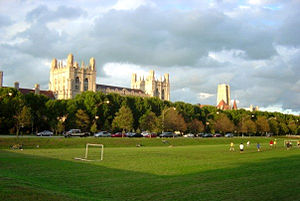City officials, community leaders and impatient Woodlawn residents are brainstorming and sharing strategies to help the struggling neighborhood, including plans for a 125- room hotel in the heart of the struggling community.
Wesley Walker, executive director of Network of Woodlawn, joined a panel of six community leaders and business people at a meeting Dec. 8 to discuss development plans

for Woodlawn at the sprawling Apostolic Church of God campus on the 6000 Block of South Dorchester Avenue, one of the few examples of successful, faith-based economic development in a neighborhood still dotted by vacant lots, boarded up buildings and burglar bars.
“The only question to ask yourselves is what you want to be as a community,” said Apostolic pastor, Rev. Dr. Byron Brazier Jr., who has pledged $100,000 dollars from the Brazier Foundation to help with the economic development plan.
Ald. Willie Cochran (20th) spoke to more than 100 residents, who sat in anticipation, as plans for Woodlawn were unveiled.
“We are going to allow [residents] to help us again,” he said. “We want organizations to help. We have to create an economy for ourselves.”
Bill Eager, vice president of the Preservation of Affordable Housing, a Chicago-based housing advocacy group, proposed putting a three star-, 125-room hotel with a full service restaurant on the northwest corner of 63rd Street and South Cottage Grove Avenue. Behind that hotel there is a plan for 75 units of market rate housing.
Under the plan, there would be some development of mixed-used properties, including about 18 units of for-sale housing and 7,000 square feet of retail space that will be on the southeast corner of 61st Street and South Cottage Grove Avenue.
“I am working with the city to put together a fund to rehab and sale the vacant and troubled properties,” said Eager. “These funds will target homeownership.”
There will be a development of 15 to 20 housing units, maybe condos, on East 62nd Street and South Cottage Grove Avenue, said Eager.
Benet Haller, director for Urban Design and Planning for the City of Chicago, agreed there are many vacant buildings that, he said, could be made into storefronts.
“There is untapped demand for retail in the Woodlawn community,” said Haller. “We have a lot of vacant store fronts, let’s get these vacant store fronts clustered together.”
Some residents said they have heard many plans over the years, but seen few results.
“We need grocery stores!” said Juanita Burris, a Woodlawn resident. “We need realistic things to happen, nothing hypothetical.”
Anthony Cole, a Woodlawn resident, agreed. “We can’t spend money in our neighborhood because we don’t even have a grocery store,” he said.
Cole spoke up about safety, a topic that was also briefly addressed by Cochran.
“You are not going to have development in the community if it feels unsafe no matter what else we do,” he said.
William Towns, president of the Office of Civic Engagement at the University of Chicago, said safety will come with the progression of housing and economic development.
There are plans for the University of Chicago to expand their campus farther south to bring in more residents and money and in return, bring about more safety efforts from the University of Chicago Police.
“We can’t have a strong Chicago without a strong South Side,” Towns said.
“We need to know what you can do, when you can do, and when we are going to start seeing it happen here,” said Maya Hugarian, another Woodlawn resident, who was concerned that all the plans the panel were showing were not concrete.
Related articles
 Renovation of 5757 S. University Ave. enters new phase(news.uchicago.edu)
Renovation of 5757 S. University Ave. enters new phase(news.uchicago.edu)













Be First to Comment